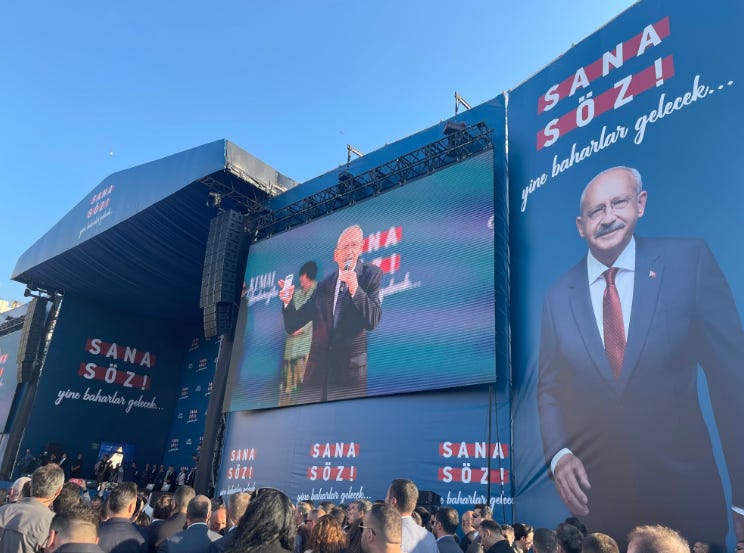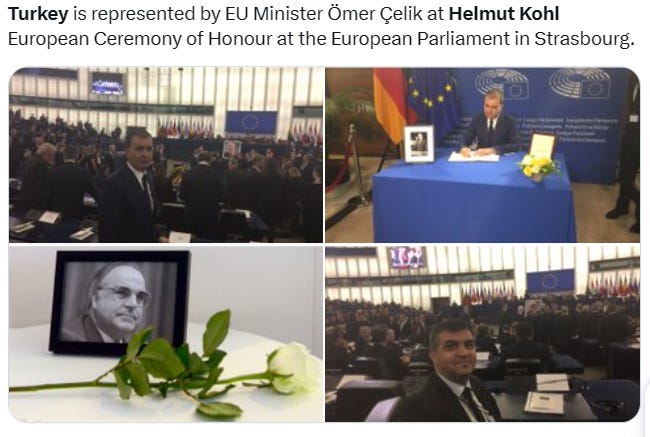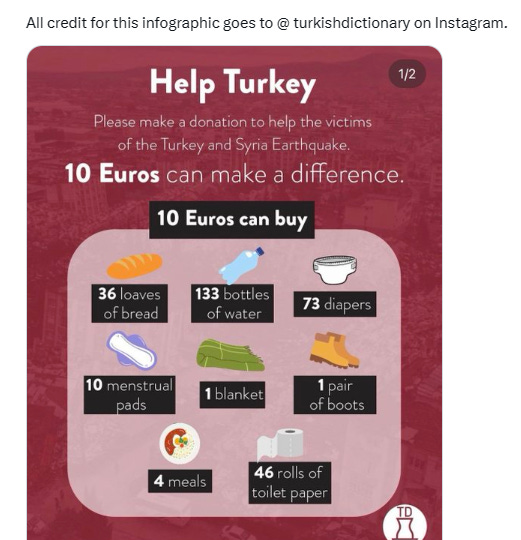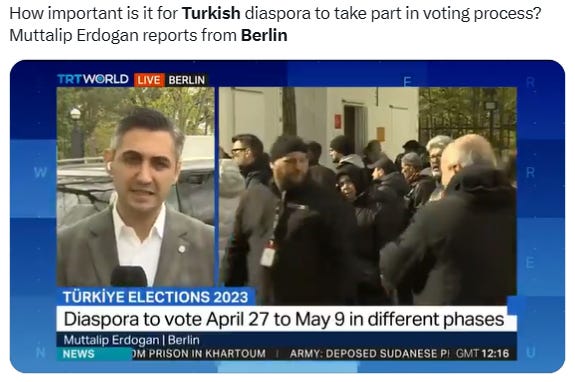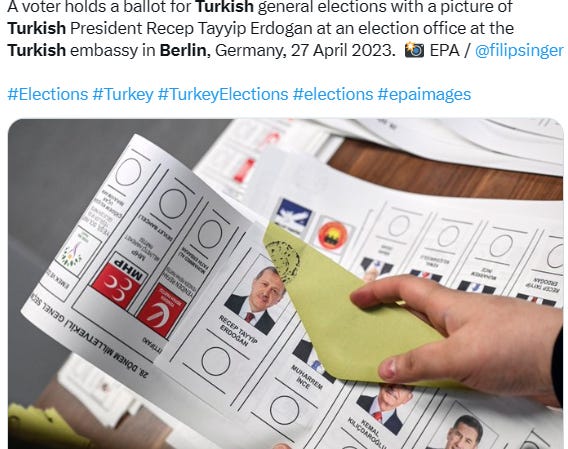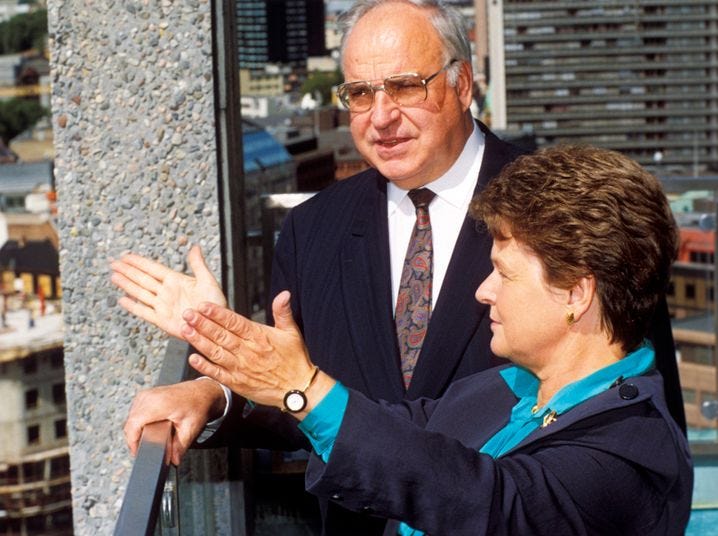Official German files indicate how Helmut Joseph Michael Kohl’s (April 3rd, 1930 - June 16th, 2017) government (chancellorship) deceived Turkiye on EU membership. Kohl’s FM told Turks that they support Turkey’s EU bid. 3 days later Kohl told the Norwegian PM: "we are against it". Turkiye belongs "in another dimension.” Goes to show what a sad bunch the pro-western Turks are. They are wannabe rejects without a home. Europeans literally telling Turks they belong in another dimension, not Europe. How much more obvious could they make it.
Pfizer and Biontech, a German tech start-up founded by the descendants of Turkish immigrants. Yes, the vaccine was developed by - gasp - immigrants. Turkish immigrants that Helmut Kohl also would have loved to send back to Turkiye as late as the 1980s/1990s.
2011 census states that 2.7 million German residents have at least one parent from Turkiye, this may not be a true representation of the total ethnic Turkish population. In 1997 former German Chancellor Helmut Kohl stated that there were 3 million Turks living in Germany. Berlin has denied Ankara's request to have 10 more polling stations, likely hampering voter turnout. "This decision complicates the voting process and forces Turkish citizens to take into account longer journeys"
Tens of thousands of people across Europe have cast their ballots in early voting in Turkish elections over the weekend, with President Recep Tayyip Erdoğan counting on diaspora support as he battles to cling to power. Officials said early indications suggested a record turnout among Turkey’s 3.4mn overseas voters, who have historically backed Erdoğan, after polling stations opened just over two weeks ahead of the main election on May 14.
The Turkish government has embarked on a voter drive it says is aimed at boosting democratic participation by increasing the number of polling stations across Europe and pumping out messages on the importance of taking part. Abdullah Eren, head of the state-run body responsible for the Turkish diaspora, insisted the motive was not to bolster support for Erdoğan, who was fighting the toughest re-election battle of his 20 years in power as Turkey’s deep economic malaise dented his support. “We’re not interested in what party they vote for,” Eren said. “For us, the important thing is that we remove obstacles to citizens exercising their rights.”
Officials from Erdoğan’s ruling Justice and Development party (AKP) openly say they expect higher turnout to benefit them, given that members of the diaspora who are eligible to vote have backed the president strongly in the past. In a message to diaspora voters on Saturday, Erdoğan said he expected them to “hurry to the polls and make history on May 14”.
But the notion that higher turnout would benefit the president was disputed by Hülya Coşkun, a regional official with the German arm of the opposition People’s Republican party (CHP). She predicted high mobilisation among well-educated opposition supporters, who she said had sometimes sat on the sidelines. “This time they see the importance of voting,” she said. “The political winds in Turkey are affecting the political winds here.” Hülya Coşkun is predicting high mobilisation among well-educated opposition supporters.
Experts say the impact of the diaspora, whose votes made up 3 per cent of the total at the last parliamentary and presidential elections in 2018, is sometimes overplayed. But the group has the potential to swing parliamentary seats and, in a presidential contest that polls suggest is neck-and-neck between Erdoğan and his main rival Kemal Kılıçdaroğlu, every vote counts. “It’s going to be really close,” said İnci Öykü Yener-Roderburg, an expert on migration at the University of Duisburg-Essen. “Even if just half of diaspora voters use their votes, it could make a difference.” Nowhere is more critical to the outcome than Germany, home to a 3mn-strong Turkish diaspora, of whom 1.5mn are Turkish citizens who are eligible to vote.
Opposition parties complain that Erdoğan has mobilised huge resources in Germany, including about 900 mosques funded and run by the Turkish state. Recommended Rachman Review podcast27 min listen Is Turkey about to see the end of the Erdoğan era? On Saturday in Essen, an AKP stronghold in the German state of North Rhine-Westphalia, a steady stream of minibuses organised by an AKP lobby group shuttled mostly elderly and disabled voters into the city from satellite towns. Thousands more people made their own way to the Grugahalle conference centre, which has been turned into a polling station replete with Turkish flags for the 13 days of overseas voting.
A majority expressed fulsome support for Erdoğan, citing a range of reasons including the president’s forceful presence on the world stage and grand infrastructure projects completed under his watch. “Erdoğan has helped Turkey to stand up proud,” said Derya Bulut, a 33-year-old pharmacist from the town of Lünen, who was born and raised in Germany. Many spoke of experiences of discrimination in Germany, where unlike EU citizens, most members of the diaspora have been forbidden from holding dual citizenship, forcing them to choose between their Turkish and German passports. Gülten Ekinci, a nurse from Dortmund who moved to Germany when she was a child, expressed distress that patients frequently asked her to remove her headscarf. “I’ve been here for 40 years but they don’t care that I work here, I pay my taxes — because I’m a Muslim,” the 48-year-old said, adding that Erdoğan had stood up for the rights of devout women like her. Gülten Ekinci is among those who say they have experienced discrimination in Germany.
Many dismissed concerns about the Turkish economy even though the lira has plunged in value in recent years and inflation has soared. Several voiced anger at the German federal government for initially refusing a request from Ankara to double the number of polling stations in the country. The vocal support for Erdoğan has fuelled a popular but false perception in Germany that most or all members of the country’s Turkish community are diehard backers of a leader viewed by many in Europe as an autocrat. Erdoğan has performed better in the country in the past than in Turkey, gaining 65 per cent of the German vote in presidential elections in 2018 compared with 53 per cent overall.
But the picture is distorted by the fact that only about half of the country’s Turkish population — which includes exiled Kurds, leftists, academics and journalists as well as the religious conservatives who have traditionally backed Erdoğan — are Turkish passport holders who are eligible to vote. When eligibility and turnout are factored in, it becomes clear that less than 15 per cent of the country’s Turkish community voted for Erdoğan in 2018.
Nonetheless, the diaspora’s participation in the Turkish elections triggers regular soul-searching about what some Germans see as failure of integration, even as figures such as agriculture minister Cem Özdemir and BioNTech founders and Covid-19 vaccine pioneers Uğur Şahin and Özlem Türeci have risen to the top of business and politics. Gülistan Yüksel, a Turkish-born member of the German Bundestag, hopes that the ruling coalition’s drive to allow multiple citizenships will help foster greater engagement with German democracy and public life among some parts of the diaspora and “strengthen their sense of belonging”.
She has found herself questioning the wisdom of overseas voting for the diaspora, even though it is supported by the Turkish opposition. “People in Turkey are often angry at German-Turks,” she said. “They say: ‘You live in a state with the rule of law in Germany, but you vote for the opposite in Turkey’.”
==========
Die Bundesregierung von Helmut Kohl (1982 bis 1998) stand stets im Verdacht, den Beitritt der Türkei zur Europäischen Gemeinschaft (EG) offiziell zu befürworten und insgeheim zu hintertreiben. Als etwa Kohls damaliger Außenminister Klaus Kinkel (FDP) beteuerte, die Türkei gehöre zu Europa und man wolle sie »dabei haben«, kommentierte SPIEGEL-Herausgeber Rudolf Augstein trocken: »Kein Wort wahr.«
Nun hat das Auswärtige Amt turnusgemäß vertrauliche Akten des Jahres 1992 freigegeben, darunter Papiere, die den Täuschungsverdacht erhärten.
Demnach erklärte Kinkel seinem türkischen Kollegen Hikmet Çetin am 13. Juli 1992 in Ankara, die Bundesregierung wisse, dass die Türkei die Vollmitgliedschaft in der EG anstrebe und werde »sie in diesem Ziel und auf dem Weg dahin unterstützen«. Der Eindruck, die Türkei sei im Kreise der Westeuropäer »nicht mehr erwünscht und sie werde in eine Nebenrolle abgedrängt, sei falsch«, auch wenn noch erhebliche Probleme zu beseitigen seien.
»Aus dem Erdkundeunterricht nicht bekannt, dass Anatolien ein Teil Europas ist«
Drei Tage später hingegen sagte Kanzler Kohl (CDU) der norwegischen Ministerpräsidentin Gro Harlem Brundtland bei einem Besuch in Oslo, aus der Türkei komme massiver Druck auf eine Vollmitgliedschaft, doch – so referiert ihn der Gesprächsvermerk– »wir seien dagegen«. Die Türkei könne »nicht Mitglied werden«, sie gehöre »in eine andere Dimension«.
Regierungschefs Kohl, Brundtland in Oslo 1992 Foto: Bjorn Sigurdson / NTB / IMAGO
Auch der damaligen polnischen Ministerpräsidentin Hanna Suchocka versicherte Kohl bei einem Gespräch in Bonn am 5. November 1992, eine Vollmitgliedschaft der Türkei sei aus deutscher Sicht »nicht vorstellbar«. Gegenüber Parteifreunden spottete der CDU–Vorsitzende, ihm sei »aus dem Erdkundeunterricht nicht bekannt, dass Anatolien ein Teil Europas ist«. Die bislang unbekannten Papiere hat das Münchner Institut für Zeitgeschichte im Auftrag des Auswärtigen Amtes ausgewählt und gibt sie heraus.
Kohl hat sich stets gegen den Vorwurf verwahrt, türkenfeindlich zu sein. Sein Sohn Peter ist mit einer Türkin verheiratet. Intern soll der Kanzler dafür plädiert haben, der türkischen Regierung gegenüber die ablehnende Haltung in der EG-Frage offen auszusprechen, aber dazu ist es während seiner Kanzlerschaft wohl nicht gekommen.
Die EG ist Vorläuferin der Europäischen Union (EU). Schon ihr Assoziierungsabkommen mit Ankara von 1963 sah die Möglichkeit eines Beitritts vor. 1987 reichte die Türkei ein offizielles Beitrittsgesuch ein. Seit 2005 laufen EU-Beitrittsverhandlungen, die jedoch seit Jahren stagnieren.
Präsident Erdoğan hat prokurdische Politiker verhaften lassen, mehrheitliche kurdische Städte wurden unter Zwangsverwaltung gestellt. Bei der Präsidentschaftswahl könnte die Minderheit nun den Unterschied machen – zugunsten der Opposition. Seit über 20 Jahren regiert Recep Tayyip Erdoğan die Türkei. Jetzt droht ihm tatsächlich die Abwahl. Eine Reise zu enttäuschten Anhängern, verarmten Aufsteigern – und zu dem Mann, der den ewigen Präsidenten verdrängen könnte.
Auch mit der Außenpolitik unter Präsident Erdoğan geht die Partei von Außenministerin Annalena Baerbock hart ins Gericht: »Wir weisen die aggressive Außenpolitik der türkischen Regierung entschieden zurück und fordern sie auf, zu einer multilateralen Außen- und Sicherheitspolitik zurückzukehren«, schreiben die Grünen. Eine Wiederaufnahme der Gespräche über einen EU-Beitritt der Türkei könne es nur geben, »wenn die Türkei eine Kehrtwende zu Demokratie und Rechtsstaatlichkeit vollzieht«.
Mit diesem Vorstoß unterstreichen die Grünen ihren Anspruch von einer wertebasierten Außenpolitik, die Menschenrechte und Völkerrecht ins Zentrum stellt. Der Wahlaufruf dürfte jedoch auch innenpolitisch motiviert sein: Seit Jahren diskutiert die Partei, wie sie migrantische Milieus in Deutschland besser erreichen kann. Hier leben rund drei Millionen türkeistämmige Menschen, etwa die Hälfte von ihnen hat einen türkischen Pass.
Sie können noch bis zum 9. Mai ihre Stimme für die Wahl in der Türkei abgeben. Präsident Erdoğan muss nach zwei Jahrzehnten an der Macht um seine Wiederwahl fürchten. Umfragen sehen ein Kopf-an-Kopf-Rennen zwischen Erdoğan und seinem Herausforderer, dem Oppositionsführer Kemal Kılıçdaroğlu, voraus. Kılıçdaroğlu tritt als gemeinsamer Kandidat für eine Allianz aus sechs Oppositionsparteien unterschiedlicher Lager an.
Die Kriminalpolizei hat nun Ermittlungen wegen gefährlicher Körperverletzung aufgenommen und bittet um Hinweise zu den mutmaßlichen Tätern. Einer der Männer soll graue Haare haben, ein kariertes Hemd getragen haben und zwischen 40 und 45 Jahre alt sein. Erste Zeugen seien befragt und Videoaufzeichnungen gesichert worden.
Brisante Wahl in der Türkei
Die Parlamentswahl und die erste Runde der Präsidentschaftswahl in der Türkei finden am 14. Mai statt. Der Termin war von Juni auf Mai vorverlegt worden. Es sind rund 64 Millionen Türkinnen und Türken wahlberechtigt, davon leben etwa drei Millionen im Ausland.
Wie die türkische Nachrichtenagentur Anadolu mit Verweis auf Zahlen der türkischen Wahlkommission YSK berichtete, können gut 1,5 Millionen stimmberechtigte Türken noch bis zum 9. Mai in Deutschland wählen. Bei den letzten Parlaments- und Präsidentschaftswahlen in der Türkei 2018 machten rund 50 Prozent der Wahlberechtigten in Deutschland von ihrem Stimmrecht Gebrauch.
Bei der brisanten Wahl tritt der amtierende Staatschef Recep Tayyip Erdoğan zum dritten Mal an, steht jedoch erstmals einer Opposition gegenüber, die ihm gefährlich werden könnte. Auch in Deutschland sorgt die anstehende Wahl bereits für Diskussionen. So hatte es etwa in Nürnberg Kritik wegen der Wahlplakate Erdoğans gegeben, die Stadt genehmigte sie jedoch nach einer Prüfung der Richtlinien.




